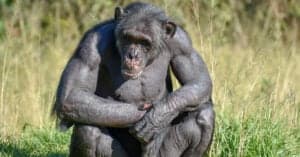Chimpanzees are the closest relatives to modern humans, sharing upwards of 98.8 percent of their DNA. It’s easy to look at these animals and think that their similarity to humans and small size makes them an easy target for humans. That may be the case if a person is using weapons and tools. Without them, though, this is a different battle entirely. So, would an unarmed human beat a chimpanzee in a fight?
We’ll set up this challenge using data from each creature to compare the two and see how they would battle each other. By the time we’ve finished, you’ll know who would win and why!
Comparing an Unarmed Human and a Chimpanzee
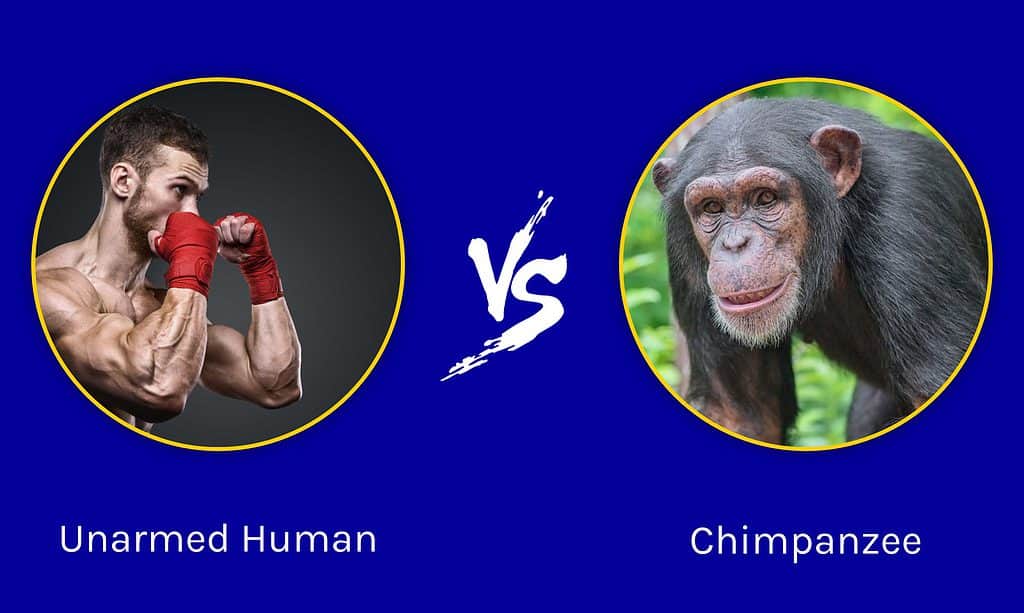
| Unarmed Human | Chimpanzee | |
|---|---|---|
| Size | Weight: average between 130 and 199 pounds Height: between 5 feet 3 inches and 5 feet 9 inches on average, but much taller is possible | Weight: 57 to 150 pounds on average Height: from 3.25 feet to 5.5 feet |
| Speed | – Between 6.5 and 8 mph running – Higher speeds are possible, upwards of 27 mph in the midst of a sprint | – Can run at 25 mph for short distances |
| Defenses | – Rely on intelligence and tools to remain safe – Without tools, humans will try to use the intelligence to their advantage – May go to places where predators can’t follow or hide – Relatively fragile body with many weaknesses in the face, neck, and other areas | – Ability to climb and hide in trees – High intelligence allows them to identify danger and get out of the way – Often live in groups to help stay safe – Relatively weak bodies with a lot of places where they can take significant damage |
| Offensive Capabilities | – Strong humans can lift their own body weight with their arms – Strong humans can exert enough force to lift 1.5 times their weight with their legs and back – Humans mostly punch, kick, bite, and grapple prey when they lack weapons – High intelligence allows humans to aim for weak spots | – Only about 1.35 times as strong as a human of the same weight – Understand how to deal significant damage to creatures by focusing on weak spots – Powerful hands and strong grip – Deadly bite with a force that is estimated at 1,300 PSI – Sharp fangs measure about an inch long or more and can easily bite through flesh |
| Predatory Behavior | – With weapons, humans are ambush, cursorial, or trapping predators – Without weapons, humans would rely on ambush to win against most prey | – Omnivorous – Can hunt with groups of other chimps for meat using rudimentary tools |
What Are the Key Factors in a Fight Between an Unarmed Human and a Chimpanzee?
The most important factors in a fight between an unarmed human and a chimpanzee include their offensive powers and defenses. This match is between two somewhat similar animals, after all. That means the stronger creature that knows how to use its strength is probably going to beat the other one.
Now, that may seem to favor the human in this situation, but that’s not entirely true. We’ll break down five total factors that are going to impact this fight. After that, we’ll combine all the information we’ve gathered together and infuse it with what we know about human and chimp altercations to conclude how such a fight would end.
Unarmed Human vs Chimpanzee: Size

Humans have the size advantage over chimpanzees.
©michaeljung/Shutterstock.com
The average human is larger and heavier than the average chimpanzee. Humans stand between 5 feet 3 inches and 5 feet 9 inches tall while weighing from 130 to 199 pounds on average. However, humans can get much larger and heavier.
Meanwhile, chimpanzees only measure 57 to 150 pounds and stand between 3.25 to 5.5 feet tall. So, the lower sizes and weights of an average human are about equal to the chimpanzees.
For the most part, unarmed humans have the size advantage.
Unarmed Human vs Chimpanzee: Speed
The average chimpanzee is much faster than the average person. These creatures can hit speeds of 25 mph while running on all fours. Humans can only run on two legs, and their average speed is somewhere between 6.5 and 8 mph. However, well-trained humans can reach speeds over 20 mph, but they cannot maintain that speed for very long.
Needless to say, chimpanzees have a speed advantage in this fight.
Unarmed Human vs Chimpanzee: Defenses
Both an unarmed human and a chimpanzee have similar physical defenses. They’re not very bulky, they lack any sort of armor to protect their bodies, and they have many weak spots that may be exploited.
However, humans are more intelligent than chimpanzees, and they can use that to their strength. Humans can confine themselves to places where enemies can’t hurt them or make rudimentary tools to help them. In this fight, the human is somewhat helpless in terms of defenses.
Chimps are also intelligent, but they realize that the best defense is a good offense in some cases. Overwhelming enemies with precise attacks can save them from harm.
All in all, both animals are quite similar in terms of defenses.
Unarmed Human vs Chimpanzee: Offensive Capabilities
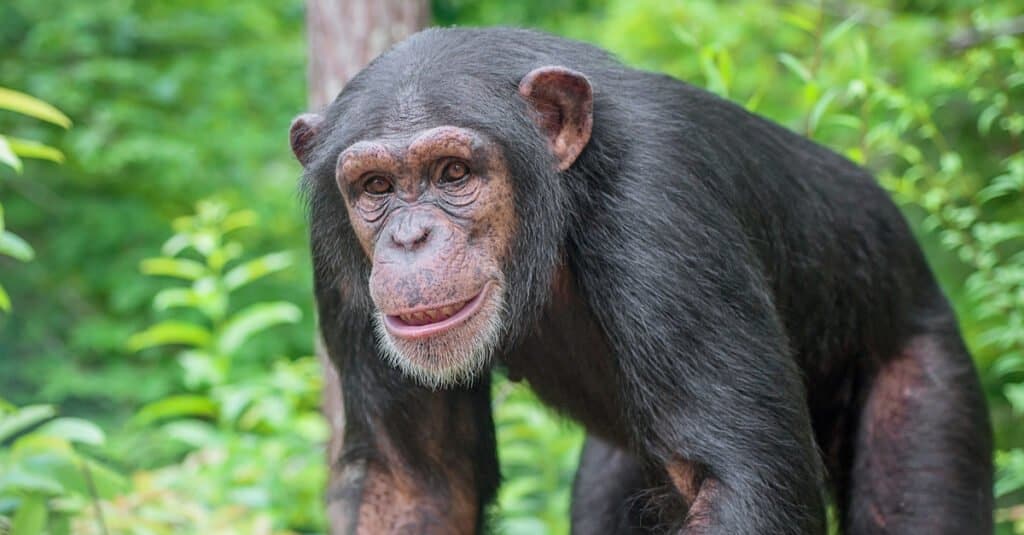
Chimpanzees have a significant bite force.
©Crystal Alba/Shutterstock.com
Without weapons or tools, humans are very limited in their offensive capabilities. They can punch, kick, wrestle, or strangle their foes. Humans have a weak bite force, and they have small teeth besides. Strong humans can lift their body weight with their arms and lift about 1.5 times their body weight with their legs.
Although chimpanzees are rumored to be much stronger than humans, they’re not. They’re only about 1.35 times as strong as the average person. Still, that is more than strong enough to inflict horrible damage on people, ripping limbs from joints and more. Their bite force is about 1,300 PSI, ten times that of a person. They have fangs that measure an inch or more, and they can use the rest of their teeth to bite into bodies and tear off flesh.
Chimpanzees have a significant advantage in offensive capabilities.
Unarmed Human vs Chimpanzee: Predatory Behavior
The average human has very little in the way of predatory behaviors. At least, they lack such behaviors when they don’t have tools or weapons. In those cases, they prefer to gather, grow, or purchase their food. With weapons, humans can use ambush tactics to claim prey. In this case, the human would have no choice but to use an ambush in hopes of gaining some advantage in the fight.
Meanwhile, chimpanzees are omnivores. When they hunt, they’ll usually bring along other members of their groups to help them. They certainly surprise their prey, but to call their tactics ambush predation seems to give them too much credit. However, they do use rudimentary tools to help them in their attacks, including makeshift spears!
Humans have the predatory behavior advantage in this fight, but it’s not an advantage that helps them.
Who Would Win in a Fight Between an Unarmed Human and a Chimpanzee?

A chimpanzee would beat an unarmed human in a fight.
©Ondrej Prosicky/Shutterstock.com
An unarmed human could not beat a chimpanzee in a fight. On even ground, the human’s best bet would be to treat the chimpanzee-like a curious friend and not do anything to antagonize it. Then, the human could try to overwhelm, pummel, or choke the chimpanzee. This may work for the biggest, strongest humans, but certainly not the average ones.
At some point, the chimp is going to respond to any harm being done to it, and it will use vicious attacks to kill the person or render them unable to fight. Chimps maul their prey and enemies, and they would do the same to humans.
They would bite the human on the face while using their overwhelming strength to tear at the nose, lips, genitals, hands, and eyes. The human would be in so much pain in such a short time that they would have no ability to counterattack.
Chimps have fatally attacked humans in the past and left some of them horribly mutilated but alive. An unarmed human would be foolish to attack a chimpanzee.
Chimpanzee Vs. Lion: Who Would Win?
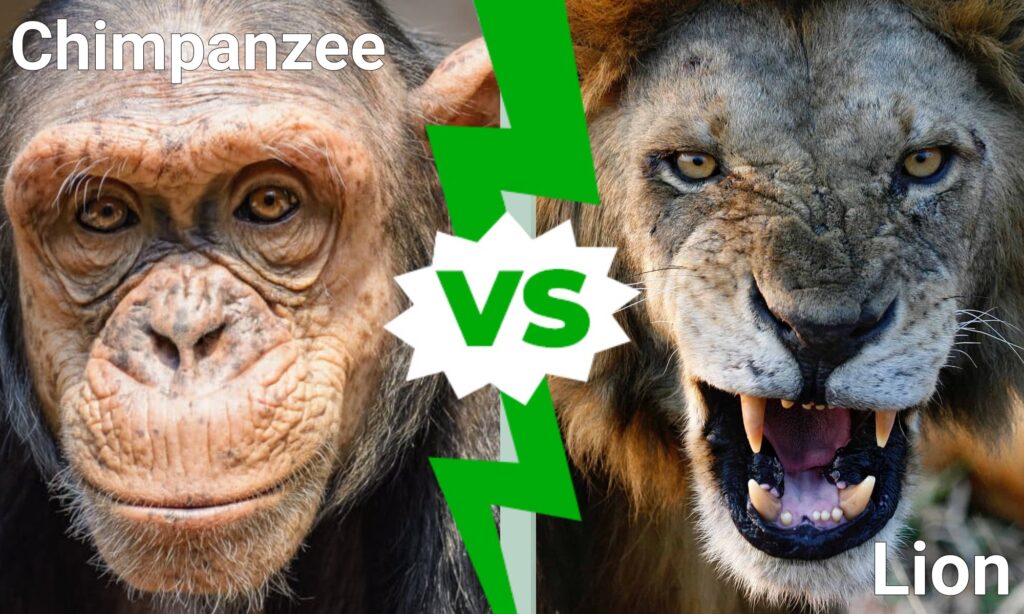
If a human is not equipped with a weapon of some sort, they are sure to lose in a standoff with a wild chimp. Regardless, there is no shortage of predators in the chimpanzee’s habitat more than capable of taking one down using only the traits nature provided them.
The Lion is one such creature. This fearsome feline is a major threat to any chimpanzees that stray from the plentiful vertical shelter of the forest. In the wild, flat plains of the Savannah and Saharah, the lion reigns supreme.
Weighing up to 4 times more than its primate opponent, a lion would only have to pounce on a chimpanzee and pin it down with its powerful paws to put it in a position from which the ape could not escape.
Bonus: Do Chimpanzees Make Good Pets?
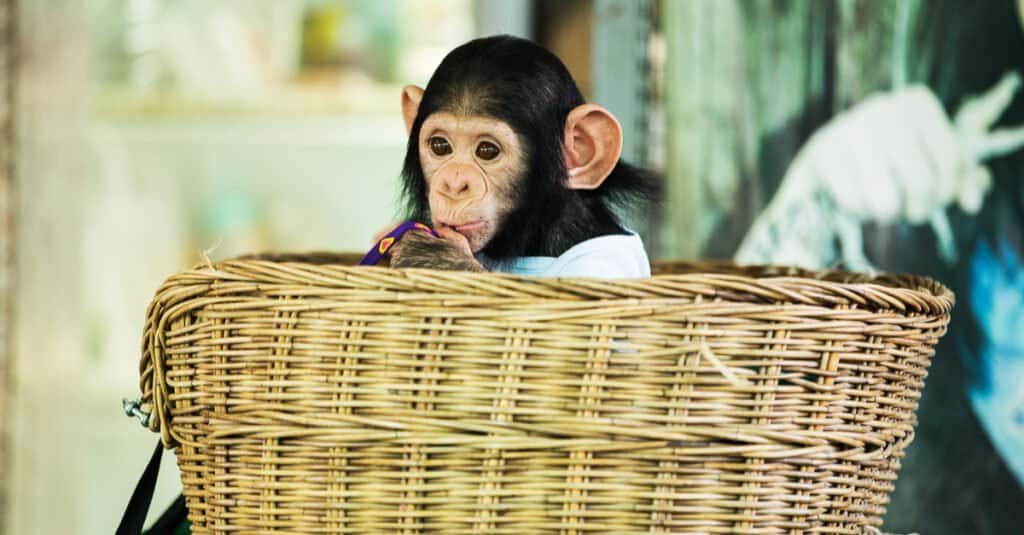
Baby chimpanzees are adorable but should not be kept as pets.
©subin pumsom/Shutterstock.com
In 2009, Charla Nash was attacked by her friend’s pet chimpanzee in what became an international news story that raised the question, “Should chimps be kept as pets?” The pet chimp ripped the woman’s entire face off – and while she did survive – her life is forever and tragically changed. Was this a freak accident or is violence part of a chimpanzee’s nature?
The answer is, yes, violence is inherent in chimpanzees and they frequently attack and kill each other in their natural habitat. Chimps are wild animals and are not domesticated. Domestication is the long process of breeding out aggression toward humans by down-grading its stress response. Dogs, cats, and cows, for example, stay much more calm in a stressful situation than a wolf, lion, or buffalo. This lower stress response means that domesticated animals rarely attack humans. By living in close proximity with people for thousands of years – some animals have been bred to live with humans more harmoniously.
Chimpanzees in captivity can grow to weigh over 200 pounds and can live for over 60 years. In the wild, they spend a lot of their time defending their territories and social status and often inflict serious injuries or even kill each other. They are known to hunt and kill rivals and their infant offspring. Pet chimps are most often obtained illegally and frequently live in unhealthy environments. These chimps, like the one that attacked Charla Nash, are a threat to neighbors if they escape their homes. Chimps belong in the wild or in zoos where they can live in groups and interact with each other – not confined as a single ape in the home of humans. They are not pets.
The photo featured at the top of this post is © Norma Cornes/Shutterstock.com
Thank you for reading! Have some feedback for us? Contact the AZ Animals editorial team.




